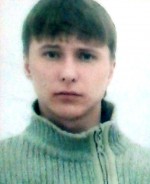It took investigator of Orsk city Investigative Department Anastasia Chichina half a year to initiate a criminal investigation into Vladimir Tkachuk’s death in the local Investigative Isolator. The investigator has at last discerned indications of a criminal offense punishable under Article 111 (4) of Russian Criminal Code (willful infliction of severe bodily harm entailing by negligence death of a person). Before that Ms Chichina had issued at least four refusals to investigate finding that no crime had been committed. In the present decision her conclusions are the opposite: there are grounds to believe a crime had been committed.

(Photo: Vladimir Tkachuk)
There is no explanation why the proceedings were initiated with such a delay. The forensic medical report of October 2013 listed a striking number of injuries observed on the dead body. Closed nonpenetrating craniocerebral trauma: intracranial haemorrhage into soft tissues located in the frontal region along the midline, 1cm to the right of the nasal bridge, spreading across the periorbital tissue of the left and the right eye, backwards as far as the lambdoid suture, on the right and left sides spreading to the parietal, temporal and occipital regions with the maximum thickness of 0,6 cm in the parieto-occipital region (region with soft tissue crush injury area); linear fracture of the cranial vault: of the occipital bone, lambdoid suture, sagittal suture line disruption, fracture of the right frontal bone; epidural hematoma (approximately 2 ml); multiple subpial hemorrhages; multiple subdural hemorrhages; multiple brain contusions; and many other injuries. As it is stated in the medical report, these injuries led to Mr Tkachuk’s death.
For six months the investigator was insisting that all the injuries listed above had been caused by a fall of a wooden plank. On the day of Vladimir’s death, 5 September 2013, a convict called the victim’s mother to inform her that her son had been beaten to death by the Investigative Isolator staff. He also told her that the authorities were going to maintain the version with the falling plank. Ms Nadezhda Chertovskikh, the victim’s mother, provided all this information when applying to the Orenburg regional branch of the Interregional NGO «Committee Against Torture».
However, from the very beginning the investigator was convinced by the following account of events: There was a wooden plank 30 cm wide and 5 cm thick leaned against the wall. With such planks the convicts were repairing the floor of the room. The length of the plank remained unestablished, though the investigator thought it to have been «approximately from 2 to 3 meters». The investigator has never seen the “monster plank”, but simply believed on the officers’ bare word. Assertedly, this very plank suddenly fell down right on Mr Tkachuk’s head. The only thing is that, judging by his injuries, the plank had to fall down on his head not only once…
Moreover, the forensic examination observed abrasions on the head and neck; the man’s genitalia were injured. These facts evidently can’t be explained with the plank version. Apparently, the investigator had sufficient grounds to initiate criminal proceedings half a year ago. Even the district prosecutor, Sergey Brodskiy, posed the question of opening a criminal case to the investigative authorities. The regional Ombudsman, Anatoliy Chadov, was as well trying to influence the situation. Despite all this, prior to initiating the proceedings Ms Chichina had issued four refusals to investigate. Each of them was appealed against and subsequently declared unreasoned and unlawful.
Undoubtedly, the procedural decision to start criminal investigation was passed in response to the steps taken and the evidence submitted by the lawyers with the Committee Against Torture, who represent the applicant’s interest. However, the State has already violated its obligation to investigate in a timely manner, and this drawback might have caused a loss of opportunity to obtain important evidence.
Timur Rakhmatulin, a lawyer working with the Orenburg regional branch of the Interregional NGO «Committee Against Torture», points at the shortcomings of the investigation: «Unfortunately, it is not at all the first time we come across a situation like this. The investigative authorities are unwilling to initiate criminal proceedings against law enforcement agents. In this very case we had to appeal against unlawful refusals to investigate, to apply to the regional Ombudsman, who was deeply concerned about the issue and sent a number of requests to competent authorities. Now, we are preparing documents for an independent expert examination in order to assess plausibility of the account of events initially introduced by the authorities. We know from our practice that a criminal investigation initiated doesn’t guarantee any effectiveness, if the investigative body doesn’t hold an interest in solving a crime. That is why the course of the investigation will be closely monitored by our lawyers».